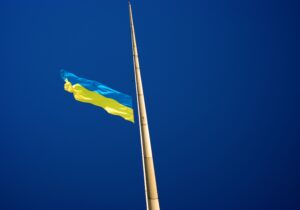In the weeks since Vladimir Putin unleashed his war on Ukraine, democratic nations have rediscovered that they have the capacity, when working together, to wield enormous power. In the Free World’s multifaceted response to Putin’s war, a blueprint for a global alliance of democracies is emerging.
Vision
A year before his inauguration, President Joseph Biden vowed to “organize and host a global Summit for Democracy.” His objectives were “to renew the spirit and shared purpose of the nations of the Free World,” to issue “a call to action for the private sector,” and to remind the Free World that “democracy doesn’t happen by accident. We have to defend it, fight for it, strengthen it, renew it.”
Biden delivered on that promise by gathering together what he called “an alliance of democracies” in December 2021. As is so often the case with such events, the summit offered more style than substance, more words than actions. But those objectives Biden outlined can be glimpsed in the Free World’s response to Putin’s war.
Renewed Spirit and Shared Purpose
“The democracies of the world,” Biden observed during his recent visit to Warsaw, “are revitalized with purpose and unity found in months that we’d once taken years to accomplish.” Just consider how NATO, the European Union, Japan, South Korea, Australia, and other free nations disconnected Russian banks from the system that enables financial transfers across 200 countries; unleashed sanctions against Putin and his crony kleptocrats; and enacted export-control measures blocking Russia’s access to high-tech products. The Free World has closed airspace to Russian aircraft, seized Russian cargo ships, and impounded Russian yachts. This barrage of financial counterstrikes—what France’s finance minister calls “all-out economic and financial war on Russia”—isolated Russia, rendered the Russian stock market “un-investable,” and pounded the Russian economy. Economists project Russia’s GDP will shrink more than 10 percent this year.
This is a dramatic example of the Free World in action—and the staggering power it can wield when its members coordinate and collaborate. One gets a sense that this has surprised the Free World as much as it has surprised Putin.
A Call to Action for the Private Sector
Spurred into action by the images, words, and refugees streaming out of Ukraine, nearly 500 multinational firms (and counting) have pulled out of Putin’s Russia or ceased operations there. From Apple and Bridgestone to Xerox and ZHA, these private-sector firms have been swept up in a virtuous cycle—and like the nations where they are headquartered, they’ve been surprised by the latent power they possess.
Defending, Strengthening, and Renewing the Free World
Danger on the doorstep has a way of focusing the mind—and reminding free peoples that freedom is not free.
With China’s military building up and pushing out, Japan has increased defense spending for 10 consecutive years and is upconverting warships into aircraft carriers. South Korea has increased defense spending by 19 percent in five years and is building an aircraft carrier for its fleet of F-35s. Australia is increasing defense spending by 40 percent and partnering with the US and Britain to add nuclear-powered submarines to its arsenal. Taiwan just approved its largest-ever defense budget.
With Putin’s designs on a reconstituted Russian Empire now laid bare, the democracies of Europe are finally realizing there’s no longer any room for free-riders in the Free World. Germany has announced plans nearly to double defense spending to 2 percent of GDP (something NATO has been begging Berlin to do since 2006); unveiled a massive $112.7-billion rearmament fund; and decided to modernize its aging air force with F-35s. Poland—thrust to the frontlines of Cold War II by Putin’s invasion—announced its defense budget will jump to 3 percent of GDP next year. Italy has outlined plans to lift its defense budget to NATO’s 2-percent-of-GDP standard. The Baltic nations are increasing defense spending, with Latvia increasing defense spending by 13 percent this year. The Dutch government is pouring more resources into defense. Norway is making immediate emergency investments in defense. Romania is increasing defense spending by 23.7 percent for fiscal year 2023.
At their emergency summit in late March, NATO’s leaders began to outline where and how these new resources will be used: In addition to existing multinational battlegroups in Estonia, Latvia, Lithuania, and Poland, NATO is standing up four more in Bulgaria, Hungary, Romania, and Slovakia. In short, from the Baltics to Bulgaria, NATO is building a wall to defend itself against Russia. And in Ukraine, NATO is helping a free people fight for their freedom. NATO has rushed thousands of tons of defensive weaponry to Ukraine in the weeks since Putin launched his criminal war. And with the Battle of Kyiv won, Ukraine continues its tenacious defense of democracy—and the weapons keep flowing.
Indeed, Ukraine illustrates how even an outmatched force—if committed and equipped with the right mix of weapons—can hobble and humble a full-spectrum military power. Yet Putin’s pummeling of Ukraine also reminds us that helping free nations deter aggression and harden their territory against invasion is preferable to scrambling to help them try to claw their territory back.
Toward that goal of hardening democracies against attack, Biden should invite Free World allies to join the United States in pooling their resources to help free nations protect themselves and deter their enemies. To borrow Ukrainian President Volodymyr Zelensky’s most famous line, “The fight is here; I need ammunition.” Free peoples need ammunition and other tools not to harm their neighbors, but to defend themselves, protect innocents, and secure their freedom. The Free World has those tools. Democracies in the Americas, Indo-Pacific, Middle East, and Europe enfold 71 percent of global GDP, 65 percent of global defense spending, 7 million men under arms, and what former Chairman of the Joint Chiefs Adm. Michael Mullen calls “a thousand-ship navy.” America and its Free World allies must become, again, the arsenal of democracy.
Foundations
This idea of a democratic alliance has supporters around the world, across the political spectrum and throughout history.
Although he is often criticized for being overly idealistic, President Woodrow Wilson was clear-eyed enough to recognize that “a steadfast concert for peace can never be maintained except by a partnership of democratic nations. No autocratic government could be trusted to keep faith within it or observe its covenants.”
Winston Churchill argued, “Freedom will not survive, peace will not be kept, unless a very large majority of mankind unite together to defend them and show themselves possessed of a constabulary power before which barbaric and atavistic forces will stand in awe.”
President Ronald Reagan called for “an army of conscience” to confront tyranny. “Just as the world’s democracies banded together to advance the cause of freedom in the face of totalitarianism,” he asked, “might we not now unite to impose civilized standards of behavior on those who flout every measure of human decency?”
More recently, Sen. John McCain championed “a worldwide League of Democracies” to “advance our values and defend our shared interests.” On the other side of the aisle, Ivo Daalder (President Barack Obama’s ambassador to NATO) has advocated a “Concert of Democracies.”
Overseas, British Prime Minister Boris Johnson has proposed enlarging the G-7 into the D-10—or “Democratic 10.” This partnership would enfold the G-7 plus Australia, South Korea and India—making it more global, more representative, and more influential than its forerunner.
“The world’s democracies should unite in an Alliance for Democracy to strengthen the forces of liberty against the forces of oppression,” argues former NATO Secretary-General Anders Fogh Rasmussen. He envisions “an unshakeable and undefeatable alliance for peace, prosperity, and the advancement of democracy.”
Future
Neither NATO nor the United Nations is suited to play this role.
While committed to democratic values, NATO is a regional organization—and suddenly very busy confronting a very serious threat on its doorstep.
The UN is a come-one-come-all open house—an organization where there’s no distinction between democracies and dictatorships, where the lawless are expected to embrace the rule of law. Thus, the UN always succumbs to lowest-common-denominator inertia. Given the UN’s systemic, built-in shortcomings, there’s nothing surprising about this. In fact, the only thing surprising about the UN is that well-meaning people continue to put their hopes and faith in it. As historian of geopolitics Robert Kaplan has noted, “The UN represents not just the hopes but more accurately the illusions of millions of people.”
Those hopes and illusions are the byproducts of the belief that freedom-loving countries such as Ukraine and might-makes-right regimes like Putin’s Russia and Orwellian governments like Xi’s China and terror tyrannies like Khamenei’s Iran and thugocracies like Assad’s Syria and prison states like Kim’s North Korea have common interests, common values, common goals. They do not.
“The universal community,” Reinhold Niebuhr observed when the UN was young, “has no common language or common culture—nothing to create the consciousness of ‘we.’” Yet Niebuhr saw hope in liberal democracies. “Modern democratic communities,” he argued, “possess a core of common spiritual possessions which the world community lacks.” That “core of common spiritual possessions” connects liberal democracies into a community of shared values and shared institutions—majority rule with minority rights, the rule of law, political pluralism, religious liberty, individual freedom, free enterprise.
Thus, quite unlike the UN, an Alliance of Democracies would not be constrained by lowest-common-denominator inertia. “The UN bureaucracy, along with others who seek a peaceful world, worship consensus,” Kaplan sighs. “But consensus can be the handmaiden of evil.” Whether caused by bureaucratic inertia or autocratic gamesmanship, the UN’s Pilate-like response to ethnic cleansing in the Balkans; repeat-offender lawlessness in Iraq, Iran, and North Korea; WMD atrocities in Syria; recidivist aggression in Russia; and criminal negligence in China underscore Kaplan’s point.
Instead of the constraints of consensus, an Alliance of Democracies could strategize solutions, authorize action by two-thirds vote, and then empower coalitions to take action in defense of free peoples. This is what we’ve seen in the Free World’s response to Putin’s war. Moreover, an Alliance of Democracies would add the imprimatur of legitimacy under international law, which is important to many US allies.
This Alliance of Democracies would not be limited to any one region and would not be stymied or sidetracked by tyrant regimes. Instead, it would be a “force for action,” in Churchill’s words, its members working to deter aggression whenever possible, repel aggression whenever necessary, and defend their interests whenever threatened—interests that, by definition, the world’s tyrants do not share.







 Sponsor a student for Christianity & National Security 2024
Sponsor a student for Christianity & National Security 2024